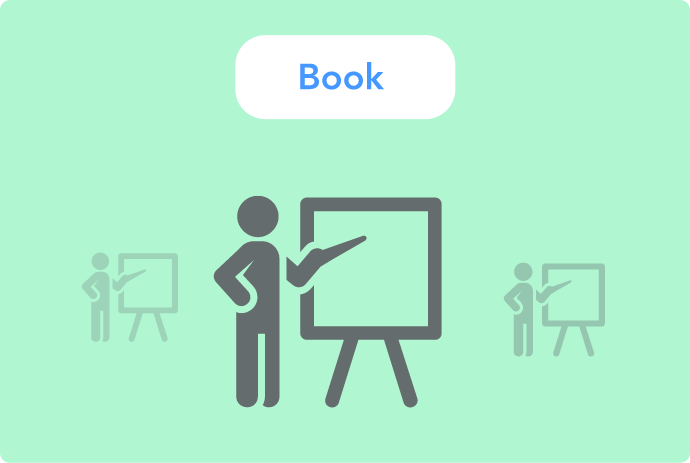
86 Student Reviews


Workshops and interactive activities developed during the classes. Flipped classroom learning in Spanish. Cognitive grammatical kind of explanation
Workshops and interactive activities developed during the classes. Flipped classroom learning in Spanish. Cognitive grammatical kind of explanation
I have done my masters in M. Sc in Genetics and Bachelors in B.Sc Biotechnology and I also have teaching experience in science for standard 8-10 th of cbse boards and ssc boards. I can teach 1st to 8 th science and 9 th and 10 th biology.
I have done my masters in M. Sc in Genetics and Bachelors in B.Sc Biotechnology and I also have teaching experience in science for standard 8-10 th of cbse boards and ssc boards. I can teach 1st to 8 th science and 9 th and 10 th biology.
Teaching Methodology and Practices for Grade 6 English: A Comprehensive Approach Teaching English to Grade 6 students (ages 11–12) requires a blend of structure, creativity, and adaptability. At this transitional stage, students are developing critical thinking skills, expanding their literacy foundation, and navigating social-emotional growth. Effective methodology must cater to diverse learning styles, foster engagement, and bridge foundational skills with higher-order competencies. Below is a detailed exploration of research-backed strategies, classroom practices, and innovative techniques tailored to Grade 6 learners. 1. Learner-Centered Pedagogy Grade 6 students thrive when they feel ownership of their learning. A learner-centered approach prioritizes student interests, autonomy, and collaboration: Differentiated Instruction: Tiered Assignments: Design tasks at varying difficulty levels. For example, in a reading comprehension activity, some students analyze a short story’s plot, while others explore character motivations or thematic symbolism. Flexible Grouping: Rotate groups based on skills (e.g., mixed-ability groups for peer mentoring, skill-specific groups for targeted grammar practice). Choice Boards: Allow students to select activities (e.g., write a poem, create a comic strip, or record a podcast) to demonstrate understanding of a text. Inquiry-Based Learning: Pose open-ended questions to spark curiosity: “Why do characters in myths often face impossible challenges?” Students research, debate, and present findings, fostering critical analysis and independent thinking. Scaffolding: Break complex tasks into manageable steps. For instance, guide students through drafting an essay: Brainstorm ideas with mind maps. Outline paragraphs with topic sentences. Draft and revise with peer feedback. 2. Interactive and Multimodal Learning Grade 6 students are digital natives who benefit from dynamic, hands-on activities that blend traditional and modern tools: Collaborative Learning: Literature Circles: Small groups read and discuss novels, with roles like Discussion Leader, Vocabulary Enricher, and Connector to promote accountability and depth. Peer Editing: Students exchange drafts and use checklists to critique grammar, structure, and clarity. Gamification: Turn lessons into games to boost motivation: Grammar Jeopardy: Teams compete to identify parts of speech or correct sentence errors. Vocabulary Charades: Act out words like “meticulous” or “ambitious” to reinforce meaning. Technology Integration: Digital Storytelling: Use tools like Book Creator or Canva to design multimedia narratives. Interactive Quizzes: Platforms like Kahoot! or Quizizz make formative assessments engaging. 3. Skill-Specific Strategies Reading Comprehension Close Reading: Annotate texts to identify literary devices, infer themes, and analyze author’s purpose. Use short, high-interest passages (e.g., sci-fi stories or biographies). Predictive Activities: Before reading, ask students to predict plot twists based on chapter titles or illustrations. Graphic Organizers: Venn diagrams for comparing characters, story maps for tracking plot structure. Writing Skills Process Writing: Emphasize drafting, revising, and editing. Use mentor texts (e.g., excerpts from Harry Potter) to model descriptive writing. Creative Prompts: Encourage imagination with prompts like “Write a letter from a villain explaining their motives.” Real-World Writing: Assign tasks like crafting persuasive emails to the principal or designing a blog post about a school event. Grammar and Vocabulary Contextual Learning: Teach grammar through authentic texts. For example, identify adjectives in a travel brochure or prepositions in a recipe. Word Walls: Display thematic vocabulary (e.g., “mystery genre terms”) with visuals and example sentences. Root Words and Affixes: Weekly focus on Greek/Latin roots (e.g., bio = life) to decode complex words. Speaking and Listening Role-Plays: Simulate scenarios like interviews or debates (e.g., “Should homework be banned?”). Think-Pair-Share: Pose a question, give think time, and have students discuss in pairs before sharing with the class. Podcast Projects: Students script and record episodes on topics like book reviews or current events. 4. Classroom Environment and Routines A supportive atmosphere is key to nurturing confidence and participation: Morning Warm-Ups: Start with 10-minute activities like journaling (“Describe a time you felt proud”) or quick grammar drills. Anchor Charts: Co-create visual aids (e.g., “Steps for Writing a Thesis Statement”) for easy reference. Positive Reinforcement: Celebrate effort with praise, “Writer of the Week” awards, or class points for collaborative goals. 5. Assessment and Feedback Formative Assessments: Exit Tickets: End lessons with prompts like “One thing I learned today…” Learning Journals: Students reflect on their progress and set weekly goals. Summative Assessments: Portfolios: Compile essays, creative writing, and project work to showcase growth. Rubrics: Use clear criteria for grading presentations, essays, and group projects. Feedback Practices: Conferencing: One-on-one discussions to review drafts and address individual needs. Peer Feedback: Train students to give constructive comments using frameworks like “Two Stars and a Wish.” 6. Social-Emotional Learning (SEL) Integration Grade 6 students often grapple with self-esteem and peer relationships. SEL strategies build empathy and resilience: Text Connections: Discuss characters’ emotions (e.g., “How did Percy Jackson handle failure?”) to relate to students’ experiences. Collaborative Projects: Group tasks teach conflict resolution and teamwork. Mindfulness Breaks: Short breathing exercises or gratitude practices to reduce anxiety. 7. Parental and Community Involvement Weekly Newsletters: Update parents on topics covered and suggest home activities (e.g., “Discuss a family story to inspire narrative writing”). Author Visits or Pen Pal Programs: Connect students with writers or peers from other schools to broaden perspectives. Addressing Challenges Mixed Proficiency Levels: Use station rotations to provide targeted support. Reluctant Readers: Offer graphic novels or audiobooks to lower barriers. Time Constraints: Integrate skills (e.g., teach grammar through editing practice).
Teaching Methodology and Practices for Grade 6 English: A Comprehensive Approach Teaching English to Grade 6 students (ages 11–12) requires a blend of structure, creativity, and adaptability. At this transitional stage, students are developing critical thinking skills, expanding their literacy foundation, and navigating social-emotional growth. Effective methodology must cater to diverse learning styles, foster engagement, and bridge foundational skills with higher-order competencies. Below is a detailed exploration of research-backed strategies, classroom practices, and innovative techniques tailored to Grade 6 learners. 1. Learner-Centered Pedagogy Grade 6 students thrive when they feel ownership of their learning. A learner-centered approach prioritizes student interests, autonomy, and collaboration: Differentiated Instruction: Tiered Assignments: Design tasks at varying difficulty levels. For example, in a reading comprehension activity, some students analyze a short story’s plot, while others explore character motivations or thematic symbolism. Flexible Grouping: Rotate groups based on skills (e.g., mixed-ability groups for peer mentoring, skill-specific groups for targeted grammar practice). Choice Boards: Allow students to select activities (e.g., write a poem, create a comic strip, or record a podcast) to demonstrate understanding of a text. Inquiry-Based Learning: Pose open-ended questions to spark curiosity: “Why do characters in myths often face impossible challenges?” Students research, debate, and present findings, fostering critical analysis and independent thinking. Scaffolding: Break complex tasks into manageable steps. For instance, guide students through drafting an essay: Brainstorm ideas with mind maps. Outline paragraphs with topic sentences. Draft and revise with peer feedback. 2. Interactive and Multimodal Learning Grade 6 students are digital natives who benefit from dynamic, hands-on activities that blend traditional and modern tools: Collaborative Learning: Literature Circles: Small groups read and discuss novels, with roles like Discussion Leader, Vocabulary Enricher, and Connector to promote accountability and depth. Peer Editing: Students exchange drafts and use checklists to critique grammar, structure, and clarity. Gamification: Turn lessons into games to boost motivation: Grammar Jeopardy: Teams compete to identify parts of speech or correct sentence errors. Vocabulary Charades: Act out words like “meticulous” or “ambitious” to reinforce meaning. Technology Integration: Digital Storytelling: Use tools like Book Creator or Canva to design multimedia narratives. Interactive Quizzes: Platforms like Kahoot! or Quizizz make formative assessments engaging. 3. Skill-Specific Strategies Reading Comprehension Close Reading: Annotate texts to identify literary devices, infer themes, and analyze author’s purpose. Use short, high-interest passages (e.g., sci-fi stories or biographies). Predictive Activities: Before reading, ask students to predict plot twists based on chapter titles or illustrations. Graphic Organizers: Venn diagrams for comparing characters, story maps for tracking plot structure. Writing Skills Process Writing: Emphasize drafting, revising, and editing. Use mentor texts (e.g., excerpts from Harry Potter) to model descriptive writing. Creative Prompts: Encourage imagination with prompts like “Write a letter from a villain explaining their motives.” Real-World Writing: Assign tasks like crafting persuasive emails to the principal or designing a blog post about a school event. Grammar and Vocabulary Contextual Learning: Teach grammar through authentic texts. For example, identify adjectives in a travel brochure or prepositions in a recipe. Word Walls: Display thematic vocabulary (e.g., “mystery genre terms”) with visuals and example sentences. Root Words and Affixes: Weekly focus on Greek/Latin roots (e.g., bio = life) to decode complex words. Speaking and Listening Role-Plays: Simulate scenarios like interviews or debates (e.g., “Should homework be banned?”). Think-Pair-Share: Pose a question, give think time, and have students discuss in pairs before sharing with the class. Podcast Projects: Students script and record episodes on topics like book reviews or current events. 4. Classroom Environment and Routines A supportive atmosphere is key to nurturing confidence and participation: Morning Warm-Ups: Start with 10-minute activities like journaling (“Describe a time you felt proud”) or quick grammar drills. Anchor Charts: Co-create visual aids (e.g., “Steps for Writing a Thesis Statement”) for easy reference. Positive Reinforcement: Celebrate effort with praise, “Writer of the Week” awards, or class points for collaborative goals. 5. Assessment and Feedback Formative Assessments: Exit Tickets: End lessons with prompts like “One thing I learned today…” Learning Journals: Students reflect on their progress and set weekly goals. Summative Assessments: Portfolios: Compile essays, creative writing, and project work to showcase growth. Rubrics: Use clear criteria for grading presentations, essays, and group projects. Feedback Practices: Conferencing: One-on-one discussions to review drafts and address individual needs. Peer Feedback: Train students to give constructive comments using frameworks like “Two Stars and a Wish.” 6. Social-Emotional Learning (SEL) Integration Grade 6 students often grapple with self-esteem and peer relationships. SEL strategies build empathy and resilience: Text Connections: Discuss characters’ emotions (e.g., “How did Percy Jackson handle failure?”) to relate to students’ experiences. Collaborative Projects: Group tasks teach conflict resolution and teamwork. Mindfulness Breaks: Short breathing exercises or gratitude practices to reduce anxiety. 7. Parental and Community Involvement Weekly Newsletters: Update parents on topics covered and suggest home activities (e.g., “Discuss a family story to inspire narrative writing”). Author Visits or Pen Pal Programs: Connect students with writers or peers from other schools to broaden perspectives. Addressing Challenges Mixed Proficiency Levels: Use station rotations to provide targeted support. Reluctant Readers: Offer graphic novels or audiobooks to lower barriers. Time Constraints: Integrate skills (e.g., teach grammar through editing practice).
I am a Sanskrit Teacher. I am giving online tutions for sanskrit from past 11 years. I teach class 1st to 10th std in all boards.
I am a Sanskrit Teacher. I am giving online tutions for sanskrit from past 11 years. I teach class 1st to 10th std in all boards.
I am an experienced, tutor with over 6 years of experience in teaching all subjects , across different board including CBSE, ICSE, and State Board. Passionate about solving problems.
I am an experienced, tutor with over 6 years of experience in teaching all subjects , across different board including CBSE, ICSE, and State Board. Passionate about solving problems.
With over seven years of experience in English language instruction, I have successfully guided students of all ages in achieving their language goals. My expertise extends to OET training, where I have dedicated over a year to helping healthcare professionals enhance their English skills for career advancement. In addition to my teaching background, I am currently involved in groundbreaking work at a cancer research center, where I leverage my skills to support critical research initiatives.
With over seven years of experience in English language instruction, I have successfully guided students of all ages in achieving their language goals. My expertise extends to OET training, where I have dedicated over a year to helping healthcare professionals enhance their English skills for career advancement. In addition to my teaching background, I am currently involved in groundbreaking work at a cancer research center, where I leverage my skills to support critical research initiatives.
To begin my teaching career at a well-linked and well reputed institute/high school and to achieve good progress in my career through all my best subject knowledge and great teaching efforts
To begin my teaching career at a well-linked and well reputed institute/high school and to achieve good progress in my career through all my best subject knowledge and great teaching efforts
l am a Maths & Science Teacher. I have been teaching in school since 5 yrs to class 7 th to 10th. l am Msc in statistics and a Ctet qualified teacher . l give online tutions with the help of live examples and develop there thinking ability so that they can solve difficult problems in an easy way.
l am a Maths & Science Teacher. I have been teaching in school since 5 yrs to class 7 th to 10th. l am Msc in statistics and a Ctet qualified teacher . l give online tutions with the help of live examples and develop there thinking ability so that they can solve difficult problems in an easy way.
I will be there for any help and will explain everything quickly
I will be there for any help and will explain everything quickly
Hi, I am well versed with all teaching aids for Maths and Science with practical examples.
Hi, I am well versed with all teaching aids for Maths and Science with practical examples.

Browse hundreds of experienced dance tutors across Pune. Compare profiles, teaching styles, reviews, and class timings to find the one that fits your goals — whether it's Arts, Assamese, Bengali, and more

Select your preferred tutor and book a free demo session. Experience their teaching style, ask questions, and understand the class flow before you commit.

Once you're satisfied, make the payment securely through UrbanPro and start your dance journey! Learn at your own pace — online or in-person — and track your progress easily.
Find the best Class 6 Tuition Tutor
 Selected Location
Selected Location Do you offer Class 6 Tuition ?
Create Free Profile >>You can browse the list of best Class 6 Tuition tutors on UrbanPro.com. You can even book a free demo class to decide which Tutor to start classes with.
The fee charged varies between online and offline classes. Generally you get the best quality at the lowest cost in the online classes, as the best tutors don’t like to travel to the Student’s location.
It definitely helps to join Class 6 Tuition near me in Hadapsar, Pune, as you get the desired motivation from a Teacher to learn. If you need personal attention and if your budget allows, select 1-1 Class. If you need peer interaction or have budget constraints, select a Group Class.
UrbanPro has a list of best Class 6 Tuition